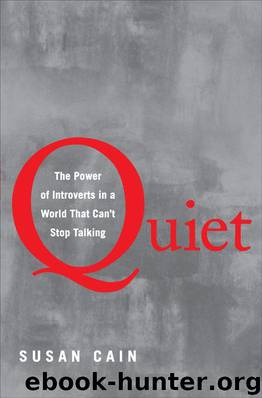Quiet: The Power of Introverts in a World That Can't Stop Talking by Cain Susan

Author:Cain, Susan [Cain, Susan]
Language: eng
Format: mobi, epub
ISBN: 9780307452207
Publisher: Random House, Inc.
Published: 2012-01-23T16:00:00+00:00
But what exactly is the mechanism by which buzz clouds good judgment? How did Janice Dorn’s client, Alan, dismiss the danger signs screaming that he might lose 70 percent of his life savings? What prompts some people to act as if FUD doesn’t exist?
One answer comes from an intriguing line of research conducted by the University of Wisconsin psychologist Joseph Newman. Imagine that you’ve been invited to Newman’s lab to participate in one of his studies. You’re there to play a game: the more points you get, the more money you win. Twelve different numbers flash across a computer screen, one at a time, in no particular order. You’re given a button, as if you were a game-show contestant, which you can press or not as each number appears. If you press the button for a “good” number, you win points; if you press for a “bad” number, you lose points; and if you don’t press at all, nothing happens. Through trial and error you learn that four is a nice number and nine is not. So the next time the number nine flashes across your screen, you know not to press that button.
Except that sometimes people press the button for the bad numbers, even when they should know better. Extroverts, especially highly impulsive extroverts, are more likely than introverts to make this mistake. Why? Well, in the words of psychologists John Brebner and Chris Cooper, who have shown that extroverts think less and act faster on such tasks: introverts are “geared to inspect” and extroverts “geared to respond.”
But the more interesting aspect of this puzzling behavior is not what the extroverts do before they’ve hit the wrong button, but what they do after. When introverts hit the number nine button and find they’ve lost a point, they slow down before moving on to the next number, as if to reflect on what went wrong. But extroverts not only fail to slow down, they actually speed up.
This seems strange; why would anyone do this? Newman explains that it makes perfect sense. If you focus on achieving your goals, as reward-sensitive extroverts do, you don’t want anything to get in your way—neither naysayers nor the number nine. You speed up in an attempt to knock these roadblocks down.
Yet this is a crucially important misstep, because the longer you pause to process surprising or negative feedback, the more likely you are to learn from it. If you force extroverts to pause, says Newman, they’ll do just as well as introverts at the numbers game. But, left to their own devices, they don’t stop. And so they don’t learn to avoid the trouble staring them in the face. Newman says that this is exactly what might happen to extroverts like Ted Turner when bidding for a company on auction. “When a person bids up too high,” he told me, “that’s because they didn’t inhibit a response they should have inhibited. They didn’t consider information that should have been weighing on their decision.”
Introverts, in
Download
Quiet: The Power of Introverts in a World That Can't Stop Talking by Cain Susan.epub
This site does not store any files on its server. We only index and link to content provided by other sites. Please contact the content providers to delete copyright contents if any and email us, we'll remove relevant links or contents immediately.
The Art of Thinking Clearly by Rolf Dobelli(8862)
Mindhunter: Inside the FBI's Elite Serial Crime Unit by John E. Douglas & Mark Olshaker(7848)
Change Your Questions, Change Your Life by Marilee Adams(6654)
Nudge - Improving Decisions about Health, Wealth, and Happiness by Thaler Sunstein(6642)
Mastermind: How to Think Like Sherlock Holmes by Maria Konnikova(6250)
The Power of Now: A Guide to Spiritual Enlightenment by Eckhart Tolle(4766)
Men In Love by Nancy Friday(4338)
Factfulness: Ten Reasons We're Wrong About the World – and Why Things Are Better Than You Think by Hans Rosling(4029)
The Confidence Code by Katty Kay(3575)
Thinking in Bets by Annie Duke(3540)
Man and His Symbols by Carl Gustav Jung(3325)
The Worm at the Core by Sheldon Solomon(2928)
Three Women by Lisa Taddeo(2925)
Why Buddhism is True by Robert Wright(2833)
Liar's Poker by Michael Lewis(2819)
The Inner Life of Animals by Peter Wohlleben(2776)
Descartes' Error by Antonio Damasio(2743)
The Power of Mindful Learning by Ellen J. Langer(2716)
The Slow Fix: Solve Problems, Work Smarter, and Live Better In a World Addicted to Speed by Carl Honore(2578)
